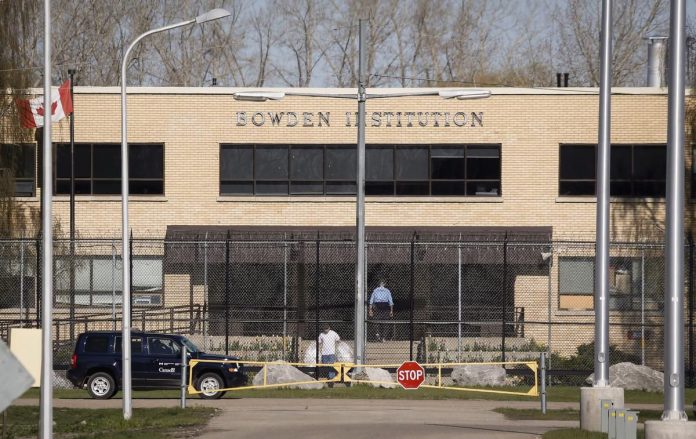[ad_1]
The population of people behind bars in Canada, overall on the decline, includes a massive overrepresentation of Indigenous inmates.
Although comprising about 5 per cent of Canada’s population, Indigenous people accounted for 27 per cent of the federal prison population in 2016–17, according to a Statistics Canada report released Tuesday. That’s a 1-point increase over the previous year, and an 8-point increase in the last 10 years.
In Saskatchewan and Manitoba, where the Indigenous populations are proportionally the largest, they formed as much as three-quarters of prison admissions in 2016–17.
“When you’re looking at what those statistics — they’re saying not enough is being done to address the social and economic disparities of the most impoverished people in this country,” said vice-chief Heather Bear of Saskatchewan’s Federation of Sovereign Indigenous Nations. “A lot of these incarcerated First Nations people have been disconnected from their people, from their communities.”
The actual rate of incarcerated Indigenous people may be even higher than what Statistics Canada reported, as Métis people who can “pass” as white may not be included, said Robert Henry, an assistant professor at the University of Calgary who studies Indigenous issues in justice and education. Often, he added, disclosing an Indigenous background in prison can make it harder for inmates to access services.
“It’s all these factors coming together, and they’ve slowly started to create this surge in what we’re seeing,” Henry said.
This is a continuation of a trend that’s been ongoing since the late ‘90s, Henry said. Though a number of complex factors are involved — such as poor access to education, media portrayal of Indigenous people as criminals and the lingering effects of residential schools — Henry said he believes a major one is the “pipeline” of Indigenous youth moving from the child welfare system into the prison system. Removing children from families, he said, introduces instability that has consequences down the line.
“We shouldn’t be surprised that we’re seeing more Indigenous people being incarcerated, because they’re already being removed at such young ages and being institutionalized,” Henry said.
A spokesperson for Correctional Services Canada told the Star in an email that the overrepresentation of Indigenous people is a “complex” issue for them, because sentencing is outside of their jurisdiction.
“However, CSC can influence the time they spend in custody by providing culturally responsive programs and interventions to address an Indigenous offender’s risk, leading to timely access to rehabilitation to foster their successful reintegration into their home and community,” the email statement read.
A Supreme Court of Canada decision last week found CSC had failed to meet its obligation to Indigenous inmates in this regard, by using risk assessment scales unproven to be effective for Indigenous people to make decisions about their incarceration. CSC said it was reviewing the Supreme Court decision.
The service said it’s implementing “several culturally responsive interventions to ensure the healing of Indigenous men and women offenders,” including Aboriginal Intervention Centres for culturally appropriate case management.
Civil rights activists argue that a major factor leading to the uneven represation of Indigeous people in prisons is over-policing.
Josh Paterson, president of the BC Civil Liberties Association called the numbers “appalling,” and said they were related to police performing a disproportionate number of checks on Indigenous people in cities like Vancouver.
“If one community is routinely, and over 100 years and more over-policed, over-surveilled, over-interfered with, it’s not a surprise they will wind up over incarcerated relative to others,” he said.
In Alberta, where Indigenous people made up 42 per cent of correctional admissions and only 6 per cent of the total population in 2016–17, more than half of the women in custody in the province were Indigenous. And for both genders, the numbers are higher than they were a decade ago.
“The numbers of Indigenous women that are now entering this system and being charged is horrible,” said Muriel Stanley Venne, president and founder of the Institute for the Advancement of Aboriginal Women in Edmonton. “The attitude as I see it is that these people are gonna go to jail, they committed crimes and they belong in jail. That’s what I hear in response to the high numbers. I want that attitude changed.”
Bear, too, says it’s high time for action, “especially in the era of Truth and Reconcilliation.”
“You need a multi-faceted approach to deal with these issues,” she said. That means investments from the provincial and federal governments in reforming both the justice system itself and social safety nets.
But to get it right, the government needs to equip First Nations so that they can take the lead, Bear said. “The system that we’re in, you may have someone working with a probation officer who has never stepped foot in a First Nation,” she said. “We know what works for us, we know what our problems are and try to fix them.”
Henry noted that a section of the Truth and Reconciliation Commission’s (TRC) 94 calls to action dealt specifically with the justice system. Across the Prairies, he said, very few of the recommendations have been implemented.
“It has not been followed through yet,” he said. “The more difficult things, it doesn’t seem to happen.”
Henry said reforming the child welfare system would also be a natural way to start fixing the issue.
These numbers aren’t surprising, but with serious time and effort they need not be inevitable, Venne said. Many measures to improve the situation going forward have been identified by the TRC and others, Venne said, but she hasn’t seen a change in attitude.
“This way, they’re just building more jails,” she said. “And we know who’s going to be in those jails.”
Emma McIntosh is an environment, justice and investigative reporter with StarMetro Calgary. Follow her on Twitter at @EmmaMci
Alex McKeen is a Vancouver-based reporter covering wealth and work. Follow her on Twitter: @alex_mckeen
[ad_2]








